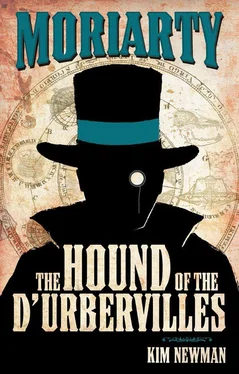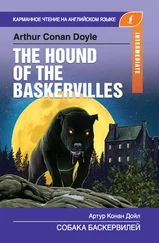Kim Newman - Professor Moriarty The Hound of the D'Urbervilles
Здесь есть возможность читать онлайн «Kim Newman - Professor Moriarty The Hound of the D'Urbervilles» весь текст электронной книги совершенно бесплатно (целиком полную версию без сокращений). В некоторых случаях можно слушать аудио, скачать через торрент в формате fb2 и присутствует краткое содержание. Жанр: Исторический детектив, на английском языке. Описание произведения, (предисловие) а так же отзывы посетителей доступны на портале библиотеки ЛибКат.
- Название:Professor Moriarty The Hound of the D'Urbervilles
- Автор:
- Жанр:
- Год:неизвестен
- ISBN:нет данных
- Рейтинг книги:5 / 5. Голосов: 1
-
Избранное:Добавить в избранное
- Отзывы:
-
Ваша оценка:
- 100
- 1
- 2
- 3
- 4
- 5
Professor Moriarty The Hound of the D'Urbervilles: краткое содержание, описание и аннотация
Предлагаем к чтению аннотацию, описание, краткое содержание или предисловие (зависит от того, что написал сам автор книги «Professor Moriarty The Hound of the D'Urbervilles»). Если вы не нашли необходимую информацию о книге — напишите в комментариях, мы постараемся отыскать её.
Professor Moriarty The Hound of the D'Urbervilles — читать онлайн бесплатно полную книгу (весь текст) целиком
Ниже представлен текст книги, разбитый по страницам. Система сохранения места последней прочитанной страницы, позволяет с удобством читать онлайн бесплатно книгу «Professor Moriarty The Hound of the D'Urbervilles», без необходимости каждый раз заново искать на чём Вы остановились. Поставьте закладку, и сможете в любой момент перейти на страницу, на которой закончили чтение.
Интервал:
Закладка:
He was one of seventy-six Frenchmen who claimed to have put that fatal arrow into Harold at the Battle of Hastings. Several began the day fighting on the English side and three didn’t even have right arms. An ancestor of the spotty prig who flogged me for misappropriation of buns at Eton shot the King from Calais. He claimed God’s winds fetched his shaft straight into Harry’s eye. This leads me to deem the typical eleventh-century frog no more trustworthy than today’s nation of moustache musketeers, bedroom bandits and painted midgets. Sir Pagan, at least, was at the battle.
Having just taken over a whole country, the new king had a lot on his plate. For a start, he was on a tear to get everyone who’d scorned him as William the Bastard to hail him as William the Conqueror. Bill the Conk couldn’t be bothered to sort through the claims, so seventy-six lying bowmen got knighted in a job-lot. After that, they felt literally entitled to claim their own fiefdoms. Sir Pagan d’Urberville’s land-grab netted him a third of Wessex. He built himself a castle at Trantridge.
Titled and landed, Sir Pagan toadied less to the Conqueror, but knocked along with the Bastard’s son, William Rufus. William I was an empire builder, a man with a mission; William II was an empire enjoyer, a pursuer of virile pastimes. Junior succeeded to the English throne in 1087 and grumbled that he would have preferred Normandy, which went to his older brother. With his pal crowned, Sir Pagan became eminent. After William Rufus remarked offhand that d’Urberville’s forest offered the finest ‘chase’ in his kingdom, it became known as The Chase.
The new king was a fiend for hunting. His primary interest was any game animal which might provide horns, hide or tusks to decorate his castles. William II was killed by a close friend while they were out after deer. Something similar happened to a tiger-stalking crony of mine in India. It was said Walter Tyrell, William Rufus’ slayer, was too good a bowman to make such a mistake. A like criticism was laid against me. I refer the interested reader to my earlier remark about how difficult it can be to just miss a shot.
With English game ripe to be brought down by Norman sports, Sir Pagan threw himself into the pursuit. Every huntsman has to have his dogs. The Trantridge kennels became famous. Though he cleans it up somewhat, Baring-Gould recounts a rumour that Sir Pagan d’Urberville himself sired the litter which became his hunting pack, getting puppies on a she-wolf imported from the Harz Mountains. The dogs came out big, hungry and red.
Even taking the she-wolf story with a pinch of the proverbial, Sir Pagan remained essentially French in his habit of tumbling anything which strayed past. You’re aware of the custom of droit de seigneur, that the feudal lord is entitled — nay, obliged — to take first jump at any local bride on her wedding night? Pagan imported the custom to England. When grooms complained, he ruled that, to be impartial about it, he’d take his pleasure with them too. Extensive romping and riding to hounds made Sir Pagan a fine, rollicking fellow to lordly Norman chums and a bitterly hated tyrant to smelly Saxon underlings.
After a few years’ happy hunting, Sir Pagan’s dickybird got him into trouble. Comes to us all, I’m afraid. Sir Pagan, like several of his lineal and nominal descendents, came a cropper because he stuck it in the wrong hole — or at least the wrong hole-bearer.
Word got out that d’Urberville was regularly rogering peasant bridegrooms. Venic of Melchester, a Saxon monk, left his monastery to raise a fuss about such shocking behaviour. He turned up at Trantridge in the middle of a feast and had the poor judgement to deliver a fiery sermon against sodomy, fornication and the wicked habit of calling English meats by French names. Sir Pagan was a firm adherent of the philosophy that you could hunt or prod anything and often do both. He had Venic whipped and set off after the monk with his dogs. Baring-Gould doesn’t go into what happened after Pagan ran down his prey in The Chase — but it’s a fair bet Venic got served in the Bulgarian fashion and staggered away bow-legged. Don’t see the attraction myself, but Mrs Halifax says it takes all sorts to butter a biscuit.
Aggrieved, Venic took a petition of complaint to the court, calling for the King’s Justice upon Sir Pagan. When William Rufus laughed off his pal’s high-spirited prankery, the monk went to the church and called for Heaven’s Justice. The Bishops knew the king and his axeman lived closer to their palaces than the Pope in Rome, let alone God Almighty, and dismissed Venic as a crank. At this, he despaired. He swore aloud at a crossroads that he would deal with the Devil, if Hell’s Justice were levelled against Sir Pagan d’Urberville…
Now pledged a monk for Satan, Venic returned to The Chase, where he lived wild, more beast than man. He harried Sir Pagan’s men-at-arms, killed the livestock and raided foodstores. Sir Pagan made his own vow to kill Venic and — for months — set out regularly with his dogs. Even before Venic moved in, The Chase was reputedly haunted. Paths were ill mapped and changed from day to day. If you walked around the wood, it was no larger than a small-holding; if you walked through, it seemed the breadth of a kingdom. Still, Sir Pagan knew his woods and should have been able to catch Venic again.
Failing to bring back his monk’s head, he grew moody. He let serfs go inviolate to their marriage beds. He failed to attend court and slid from Royal favour — making room for the rise of Walter Tyrell… and we all know how well that turned out.
He laid off hunting anything but the mad monk.
Cheated of regular prey, the pack became unruly, vicious, and fought among themselves. Soon, they were killing and eating each other. That’s when Sir Pagan first noticed Red Shuck. Originally the runt of the she-wolf’s litter, he grew stronger, surviving many battles. He grew wilder, redder even, as if taking on substance from dogs he killed, ’til he stood tall as a pony, long as a boat — with bloody froth about his mouth and fangs like daggers. Sir Pagan’s remaining cronies cautioned him against the dog, but the Master was pleased with Red Shuck. He thought that only when it had consumed the hearts of the rest of the pack would it be able to root out Venic. At last, Red Shuck had the kennel to himself, as Sir Pagan was left alone with his servants by the desertion of his household. His wife and children removed themselves across Wessex and established the d’Urberville seat of Kingsbere.
Still, Venic was not found, no matter how knight and dog sought him. He would appear in the village, speaking against Normans in general and Sir Pagan in particular — but when d’Urberville and Red Shuck came, he was back in The Chase. This went on until Sir Pagan took it into his head to flush out his quarry by burning the forest to ash. In India, this is known as hunquah. It’s a tricky practice, as likely to raze the village as flush out the tiger.
Hayricks were carted to a clearing and a fire started. It wouldn’t spread, as if the breath of Hell kept it back. At sunset, Sir Pagan sensed his enemy nearby and sicced his dog. Red Shuck bounded from the clearing, intent on rending Venic apart. Fearful cries, human and animal, were heard. Sir Pagan’s last servants abandoned him — except one page, necessary to recount the end of the story. Sir Pagan ranted at the trees, his failing fire and the skies. Then, who should step into the clearing but Venic of Melchester, wearing the bloody skin of Red Shuck.
Most versions of the tale throw in ‘hold, varlet’/‘Norman dog’/’Saxon swine’/‘have at thee, sirrah’ chatter out of Ivanhoe. I imagine the actual talk between mortal enemies ran to free exchange of Old English and French words not in Sir Walter Scott’s vocabulary.
Читать дальшеИнтервал:
Закладка:
Похожие книги на «Professor Moriarty The Hound of the D'Urbervilles»
Представляем Вашему вниманию похожие книги на «Professor Moriarty The Hound of the D'Urbervilles» списком для выбора. Мы отобрали схожую по названию и смыслу литературу в надежде предоставить читателям больше вариантов отыскать новые, интересные, ещё непрочитанные произведения.
Обсуждение, отзывы о книге «Professor Moriarty The Hound of the D'Urbervilles» и просто собственные мнения читателей. Оставьте ваши комментарии, напишите, что Вы думаете о произведении, его смысле или главных героях. Укажите что конкретно понравилось, а что нет, и почему Вы так считаете.


![Беар Гриллс - The Hunt [=The Devil's Sanctuary]](/books/428447/bear-grills-the-hunt-the-devil-s-sanctuary-thumb.webp)









